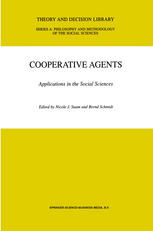

Most ebook files are in PDF format, so you can easily read them using various software such as Foxit Reader or directly on the Google Chrome browser.
Some ebook files are released by publishers in other formats such as .awz, .mobi, .epub, .fb2, etc. You may need to install specific software to read these formats on mobile/PC, such as Calibre.
Please read the tutorial at this link: https://ebookbell.com/faq
We offer FREE conversion to the popular formats you request; however, this may take some time. Therefore, right after payment, please email us, and we will try to provide the service as quickly as possible.
For some exceptional file formats or broken links (if any), please refrain from opening any disputes. Instead, email us first, and we will try to assist within a maximum of 6 hours.
EbookBell Team

4.8
74 reviewsAgent-based modelling on a computer appears to have a special role to play in the development of social science. It offers a means of discovering general and applicable social theory, and grounding it in precise assumptions and derivations, whilst addressing those elements of individual cognition that are central to human society. However, there are important questions to be asked and difficulties to overcome in achieving this potential. What differentiates agent-based modelling from traditional computer modelling? Which model types should be used under which circumstances? If it is appropriate to use a complex model, how can it be validated? Is social simulation research to adopt a realist epistemology, or can it operate within a social constructionist framework? What are the sociological concepts of norms and norm processing that could either be used for planned implementation or for identifying equivalents of social norms among co-operative agents? Can sustainability be achieved more easily in a hierarchical agent society than in a society of isolated agents? What examples are there of hybrid forms of interaction between humans and artificial agents? These are some of the sociological questions that are addressed.